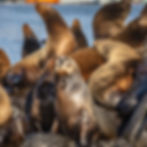Newport's Noisy Neighbors: the Sea Lions of the Bayfront
- John Perez
- Apr 22, 2025
- 3 min read
Updated: Jun 11, 2025

Newport’s working waterfront is a mix of boats, seafood, and storefronts, but it’s also home to one of the most distinctive and loudest sights (and sounds) on the Oregon Coast: sea lions. Whether sunbathing on the docks or barking in chorus, these seasonal visitors are a memorable part of the Bayfront experience.
Where to See Sea Lions in Newport
The most reliable place to see sea lions is at the public viewing platform near Port Dock One along Newport’s Historic Bayfront. Floating docks below the platform are often covered with sea lions lounging in the sun or bickering over the best spot.
Walk the boardwalk nearby for other viewing angles, and keep your ears open, you’ll likely hear them before you see them.
Sea lions can also occasionally be found out on private docks, commercial piers, or other floating platforms throughout Yaquina Bay. While entertaining to watch, they are large, wild animals. Give them plenty of space and do not attempt to approach.
What Kind of Sea Lions Are They?
Most of the sea lions spotted in Newport are California sea lions (Zalophus californianus). Males can weigh over 800 pounds and are known for their vocal, territorial behavior. They are highly social and often gather in large groups, especially outside of their breeding season.
Newport also occasionally sees Steller sea lions, which are larger, lighter in color, and typically less vocal.
When Are Sea Lions Most Active?
California sea lions are most frequently seen in Newport between late summer and early spring. Many males migrate north after the breeding season to rest and feed, and Yaquina Bay offers calm waters, easy access to food, and floating docks.
Numbers may decline during summer when most males return south to breed. However, a few can still be seen year-round.
Why Newport?
Sea lions are drawn to Newport for its reliable food sources, calm protected waters, and open-access docks. Commercial fishing activity in the area means fish scraps are occasionally available, and the protected harbor is ideal for resting.
They’ve adapted well to the busy waterfront and have become part of the local rhythm, often attracting curious visitors and photographers.
Sea Lions and Science
Organizations like Hatfield Marine Science Center and NOAA have studied sea lion behavior, migration, and health as part of their broader marine research programs. Some of this work includes:
Tagging and tracking sea lion movements along the coast
Studying their diet and how it changes with local fish populations
Monitoring interactions between sea lions and fisheries
Researchers also work on public outreach to help people better understand how marine mammals coexist with coastal communities.
Respectful Viewing Tips
Sea lions may appear relaxed and approachable, but they are wild animals and protected under the Marine Mammal Protection Act. Here’s how to view them responsibly:
Keep a safe distance and use the designated viewing platform
Never try to feed or touch them
Keep pets leashed and quiet around known haulout areas
Be aware of your surroundings, especially near commercial docks or floating platforms, where sea lions may be resting
Nearby Places to Explore
After watching the sea lions, enjoy more of the Bayfront by visiting:
Local restaurants and cafes with harbor views
Marine-themed shops and galleries along the boardwalk
The Oregon Coast Aquarium and Hatfield Marine Science Center, just across the bridge in South Beach, for more wildlife and educational exhibits
Sea lions are loud, lively, and a little unpredictable, but that’s part of what makes them so fun to watch. They’re an unmistakable part of Newport’s coastal experience and a reminder that marine life is always close at hand here. Next time you’re on the Bayfront, stop and spend a few minutes with Newport’s noisiest neighbors.
Newport’s working waterfront is full of natural life, cultural history, and engaging experiences. For more ways to explore local wildlife, science centers, and seasonal happenings, visit https://discovernewport.com